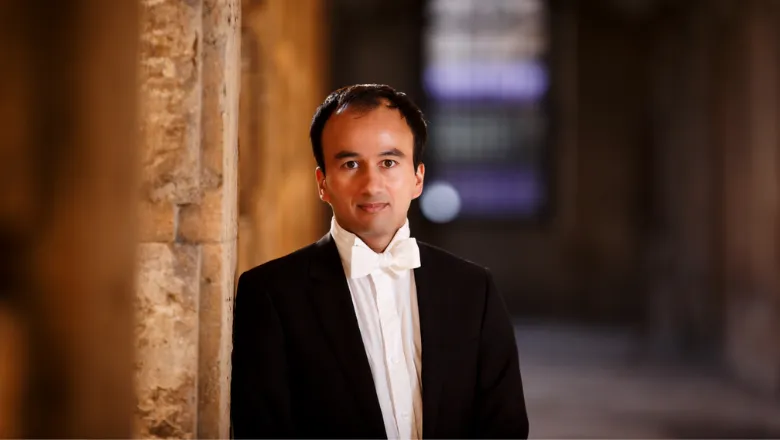Everyone who can speak can also sing. If you are looking for a way to relax, meet new people and improve your health, join a choir!
05 February 2020
Singing and psychology: the creative life of Dr Rashmi Patel
Dr Rashmi Patel, MRC Health Data Research UK Fellow in the Department of Psychosis Studies, discusses his life double life in medicine and choral singing.

Tell us a little about yourself and what you do.
My name is Rashmi, and I am a tenor singer and MRC Health Data Research UK Fellow in the Department of Psychosis Studies at King's. I trained as a classical singer while studying Medicine in Cambridge and Oxford. Choral music is beautiful and uplifting and after a long day of lectures or (seemingly endless) ward rounds I would join the choral scholars for evensong; an opportunity for peaceful reflection amidst our fractious world.
In which ways do you feel singing has added to your life?
I have been privileged to meet some wonderful people, some of whom have gone on to stellar careers as composers, conductors and performers. I have also had the opportunity to sing in some incredible places and to travel around the world to perform in concert tours. Choral singing has added a unique dimension to my medical academic career and continues to enrich my life.

Do you feel that singing and psychology have anything in common?
There is a deep connection between musical composition and the human psyche. Music expresses emotion in a way that written or spoken words alone cannot: the intense melancholy which pervades Robert Schumann’s song cycles, or the well of grief in Herbert Howells’ Hymnus Paradisi, composed following the death of his 9-year old son to polio, or the anguish of Captain Edward Fairfax Vere as he realises that he will send his crewman to their death in Benjamin Britten’s opera Billy Budd. What might take a writer an entire chapter could be conveyed by a composer in a short cadence, or even a single chord.
Have you had any particularly memorable moments as a singer?
I had the privilege of singing The Evangelist in J.S. Bach’s St. John Passion at a concert in Pembroke College, Oxford. The part consists entirely of freely-moving recitative, where you sing following the rhythms of ordinary speech – quite tricky in places! Prior to the day of the concert I hadn’t heard any of the choral sections performed in context. It was only during the performance when I heard the thunderous sound of the first chorus behind me that I realised what an awe-inspiring piece of music it is – it was an electrifying experience!
What would you say to somebody who might be interested in taking up singing?
Everyone who can speak can also sing. If you are looking for a way to relax, meet new people and improve your health, join a choir!
Training to be a singer isn’t just about learning to read music. Learning how to stand and breathe is just as important. Singing in a choir also teaches you to observe and listen to others around you, as well as learning how to organise yourself to make sure you don’t let others down by turning up late!
Read more about Dr Rashmi Patel's creative life in his My MedSciLife feature by The Academy of Medical Sciences: https://medscilife.org/stories/rashmi-patel/
